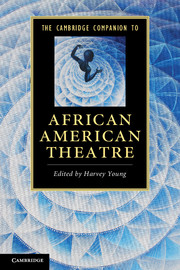Book contents
- Frontmatter
- Contents
- Illustrations
- Contributors
- Acknowledgements
- Chronology
- Introduction
- 1 Slavery, performance, and the design of African American theatre
- 2 Slave rebellions on the national stage
- 3 Early black Americans on Broadway
- 4 Drama in the Harlem Renaissance
- 5 The Negro Little Theatre Movement
- 6 African American women dramatists, 1930–1960
- 7 Amiri Baraka and the Black Arts Movement
- 8 Fragmented musicals and 1970s soul aesthetic
- 9 Spectacles of whiteness from Adrienne Kennedy to Suzan-Lori Parks
- 10 African American performance and community engagement
- 11 Women playwrights who cross cultural borders
- 12 African Diaspora drama
- 13 Black theatre in the age of Obama
- Further reading
- Index
- References
Introduction
Published online by Cambridge University Press: 05 December 2012
- Frontmatter
- Contents
- Illustrations
- Contributors
- Acknowledgements
- Chronology
- Introduction
- 1 Slavery, performance, and the design of African American theatre
- 2 Slave rebellions on the national stage
- 3 Early black Americans on Broadway
- 4 Drama in the Harlem Renaissance
- 5 The Negro Little Theatre Movement
- 6 African American women dramatists, 1930–1960
- 7 Amiri Baraka and the Black Arts Movement
- 8 Fragmented musicals and 1970s soul aesthetic
- 9 Spectacles of whiteness from Adrienne Kennedy to Suzan-Lori Parks
- 10 African American performance and community engagement
- 11 Women playwrights who cross cultural borders
- 12 African Diaspora drama
- 13 Black theatre in the age of Obama
- Further reading
- Index
- References
Summary
In June, 1996, playwright August Wilson delivered a keynote address at the biennial gathering of the Theatre Communications Group (TCG), a professional organization of theatre artists and scholars. Arriving at the podium, the two-time Pulitzer Prize winner, who was widely considered to be the most influential voice active in the American theatre, surveyed the assembled audience. He saw the leaders of prominent regional theatres in the country, emerging young artists eager to take their places, and critics whose pens had the power to attract (or drive away) corporate and governmental funding. There were several hundred attendees. The vast majority of them were white. Wilson was not surprised by the composition of his audience. Having developed his seven history plays on the African American experience, which were part of a planned ten-play cycle, at regional theatres across the country en route to Broadway, the accomplished playwright was well aware of the complexion of American theatre. His success, his standing at the podium on that day and, more generally, as one of the world’s greatest living playwrights, was aided by many of the people who sat before him. Now, they were awaiting his remarks.
Wilson’s “provocative” and “passionate” address, which would later be published under the title “The Ground on which I Stand,” triggered a national conversation, within the arts, about race, multiculturalism, and cultural separatism. It catalyzed a series of debates, including a couple featuring August Wilson and his primary antagonist, theatre critic Robert Brustein. It inspired scholars to interrogate the relevance of the “color line” at the end of the twentieth century and within the theatre. Standing at the podium, Wilson asserted that more opportunities needed to be made available to non-white artists to create and engage in work that reflects their unique cultural experiences and history. He criticized colorblind casting practices for not acknowledging cultural difference. He called for the creation of ethnic theatres whose missions would be to champion the work of and create opportunities for artists of color.
- Type
- Chapter
- Information
- The Cambridge Companion to African American Theatre , pp. 1 - 14Publisher: Cambridge University PressPrint publication year: 2012
References
- 1
- Cited by



